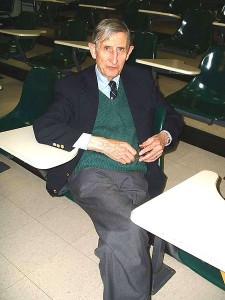
"Dyson and his colleagues did not want to delegate; they intended to go bombing into space themselves." (Image by Lumidek.)
Kenneth Brower has an article in The Atlantic in which he tries to get to the bottom of Freeman Dyson’s troubling views about climate change and environmental responsibility, terrain previously covered by the Times Magazine. The piece has some great info about how Dyson and a group of fellow scientists hoped five decades ago to blast themselves to Mars and Saturn with a nuclear-powered rocket, a plan that had to be scrapped after the signing of the Limited Test Ban Treaty in 1963. An excerpt:
“The period of his career that Dyson remembers most happily, the endeavor during which he believes he learned the most, began the year after Sputnik. In 1958, he took a leave of absence from the Institute for Advanced Study and moved to La Jolla, California, where he joined Project Orion, a group of 40 scientists and engineers working to build a spacecraft powered by nuclear bombs. The Orion men believed that rocketry was hopeless as a means of settling the universe. Only nuclear power had sufficient bang to propel the requisite payloads into space. The team called the concept ‘nuclear-pulse propulsion.’ From a hole at the center of a massive ‘pusher plate’ at the bottom of the craft, atom bombs would be dropped at intervals and detonated. The shock wave and debris from each blast would strike the pusher plate, driving the ship heavenward on a succession of blinding fireballs. Shock absorbers the size of grain silos would cushion the cabin and crew, smoothing out the cataclysmic bumpiness of the ride.
To the layperson, this seems exactly the sort of contraption that Wile E. Coyote, in his efforts to overtake Road Runner, habitually straps on before self-immolation. But the layperson is wrong, apparently. Specialists in the effects of nuclear explosions saw no reason Orion would not work. The Advanced Research Projects Agency, the precursor to NASA, underwrote the project, then NASA took it on, and nuclear-pulse propulsion briefly held its own against the chemical rockets of Wernher von Braun. Dyson and his colleagues did not want to delegate; they intended to go bombing into space themselves. Their schedule had them landing on Mars by 1965 and Saturn by 1970.”
Tags: Freeman Dyson, Kenneth Brower
